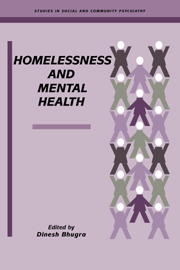Book contents
- Frontmatter
- Contents
- List of contributors
- Preface
- Part I INTRODCTION AND SPECIAL GROUPS
- Part II SERVICES
- Part III INTERNATIONAL PERSPECTIVE
- 12 European perspectives
- 13 Lessons from America: semantics and services for mentally ill homeless individuals
- 14 Homelessness and mental health: lessons from Australia
- Part IV POLICY AND EVALUATION
- Index
12 - European perspectives
from Part III - INTERNATIONAL PERSPECTIVE
Published online by Cambridge University Press: 15 October 2009
- Frontmatter
- Contents
- List of contributors
- Preface
- Part I INTRODCTION AND SPECIAL GROUPS
- Part II SERVICES
- Part III INTERNATIONAL PERSPECTIVE
- 12 European perspectives
- 13 Lessons from America: semantics and services for mentally ill homeless individuals
- 14 Homelessness and mental health: lessons from Australia
- Part IV POLICY AND EVALUATION
- Index
Summary
Reviews of homelessness and mental disorder in the UK inevitably draw comparisons with the situation in the USA (for example Scott, 1993). It is often assumed that the findings of any US study of homeless people (from the level of frostbite in New York to the rates of drug abuse in homeless women) are unquestionably generalizeable to UK populations. In fact close comparisons between the USA and UK are sometimes seriously misleading. In a Western democracy, the level of homelessness is essentially a product of social policy, and so too is the level of mental disorder amongst the homeless. In social policy terms, (for example, in the provision of subsidized housing, free health care, and state benefits) the UK now stands somewhere between American and European norms. Thus, the UK resembles the USA in that it has increasingly adopted a free market housing policy. On the other hand, the UK government remains committed (in public) to the European ethos of a national health service, and a reasonable level of state assistance to the unemployed and disabled.
Mental disorder in homeless women is a good example of an area where USA—UK comparisons may mislead, when differences in social policy are not taken into account. In the UK, local authorities are obliged to provide emergency accommodation to homeless families (usually a lone woman with children), and to rehouse such families as a priority. Whilst these families may face long periods in temporary accommodation (bedsits), they are eventually rehoused, and do not have to make use of emergency shelters or hostels. In the USA there is usually no obligation to rehouse homeless families.
- Type
- Chapter
- Information
- Homelessness and Mental Health , pp. 187 - 229Publisher: Cambridge University PressPrint publication year: 1996

